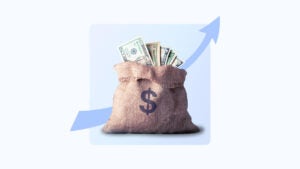Personal loan alternatives for bad-credit borrowers

Key takeaways
- Many alternatives to bad credit loans may come with lower costs and save you money in the long run.
- Secured options may help you get the financing you need, but will put your collateral — property used to secure the loan — at risk if you default.
- It’s important to improve your credit score to have better borrowing options in the future.
There are several ways to get cash if you have bad credit and don’t want to take out a bad credit personal loan. Lower-cost alternatives exist for nearly every scenario, and many are easier to qualify for than a traditional personal loan.
For example, you may be better off using a credit card, asking a friend or family member for help or tapping your 401(k) for funds. These alternatives may require a bit more legwork to access and slightly slower funding times, but the interest savings could be well worth it.
8 personal loan alternatives for bad-credit borrowers
Having less-than-stellar credit doesn’t always mean you are stuck with high bad credit loan rates. There are loan alternatives for people with bad credit that feature lower costs and — in some cases — similar funding timelines.
Alternatives at a glance
- Credit card
-
A credit card is a flexible option for unexpected expenses, and there are several options available for credit-challenged individuals.
- Peer-to-peer (P2P) loan
-
A P2P loan is funded by a group of investors and often comes with more flexible lending guidelines than a traditional loan.
- Home equity loan or home equity line of credit (HELOC)
-
A home equity loan or HELOC allows you to convert your equity into cash and use it however you see fit.
- Buy now, pay later (BNPL) loan
-
A BNPL plan makes larger purchases more affordable, and you can skip hefty borrowing costs.
- Payment plan
-
You can request a payment plan if you have an outstanding utility bill, medical bill or tax bill you’re unable to pay at once.
- Loan from a friend or relative
-
A loan from a friend or relative is a low- or no-cost option to borrow funds, assuming you can uphold your end of the bargain.
- Retirement account loan
-
A 401(k) loan is a short-term installment loan that doesn’t require a credit check and comes with low interest rates.
- Cash-out refinance
-
A cash-out refinance lets you swap out your current loan for a new, larger one and pocket the difference in cash.
1. Use a credit card
A credit card is better for those who need to cover small expenditures and who are disciplined enough to only spend what they can afford to repay it in full each month.
Credit cards for bad credit may give you the funds you need in a tight spot. Rates are much lower than payday or auto title loans, though they may be similar to those of a bad credit personal loan.
Credit cards are more flexible than installment loans in two ways. First, you can use only the amount you need, rather than borrowing in a lump sum.
Second, with an installment loan, you must make a fixed monthly payment toward both the interest and principal. With a credit card, you can make minimum payments on the amount you borrow until you have the cash to pay the balance off.
Keep in mind that making a habit of only paying the minimum amount could lead to interest building fast, so avoid this if possible. You may be able to avoid paying interest altogether with a credit card if you can pay off your monthly balance, making it an ideal option for smaller expenses.
2. Consider a peer-to-peer (P2P) loan
P2P loans are better for those who want an installment loan but can’t qualify with traditional lenders.
Getting a loan from a bank or credit union can be challenging if you have bad credit and don’t meet that particular lender’s requirements. Peer-to-peer lenders match you with loans funded by groups of investors. P2P loans can be easier to get approved for than traditional loans. Investors may be more willing to share the risk of lending to low-credit applicants.
While the average personal loan requires a credit score in the mid-600s, peer-to-peer loans may offer loans as low as 600. Funding times are often similar to what personal loan lenders offer. Like other bad credit loans, your credit score dictates how low your rates and fees will be.
Learn more: Check out Bankrate’s review of peer-to-peer lender, Prosper
3. Use a home equity loan or HELOC
Home equity options are better for those who have a sizable amount of home equity, given that will dictate how much you can borrow.
If you own a home with enough equity, you can tap that equity with a home equity loan or a home equity line of credit (HELOC). You typically need a credit score of at least 620 to qualify, but rates are significantly lower than credit cards and payday loans.
A home equity loan works like a personal loan but with a much longer repayment period. You will be paid out in a lump sum and make fixed payments over a set period, usually between five and 30 years.
A HELOC operates more like a credit card, giving you access to your funds as needed during the “draw period,” which typically lasts between 10 and 15 years. You can borrow what you need as you need it up to a limit during this period and will have a repayment term of around 20 years.
Both types of loans are considered second mortgages, meaning you have two monthly mortgage payments. And you’ll have to put your home up as collateral. While this makes them more affordable and easier to get approved for, it also means that the lender can seize your home if you fail to make the payments.
4. Consider using a buy now, pay later (BNPL) loan
BNPL loans are better for consumers who want to split up purchases into smaller payments to make them more affordable and avoid steep interest costs associated with credit cards.
A buy now, pay later loan is a short-term repayment plan that allows you to split up purchases into four monthly installments. Most online retailers offer BNPL options. Numerous mobile and desktop apps host thousands of retailers that offer the financing option.
Most BNPL apps and services don’t require a credit check, so those who have no credit history or a very low score can still qualify. Keep in mind that some of these apps have interest rates that are extremely high should you miss a payment. Plus, the convenience of BNPL loans can make it easy to spend over your budget.
Only those who have a good handle on their finances and spending habits should consider taking out multiple products at once. Multiple debt streams can become difficult to manage. Missed payments could result in credit damage if the company reports to the three credit bureaus.
5. Request a payment plan
Repayment plans are best for those who are struggling to manage utility, medical or tax bills and seek affordable monthly payments.
Depending on the expense, you can request a payment plan to spread out the payments, rather than take on more debt. You may be eligible for low- or no-interest payment plans to pay for:
- Utility bills.
- Medical expenses.
- Dental work.
- Taxes.
Utility companies may extend your due date or allow you to pay it over several months. Ask about “level pay” options that give you a predictable payment for electric, water or gas bills. This can help you avoid high bills during peak usage seasons, like winter and summer.
Medical and dental offices often offer options to spread your payments over several months. If you get behind on federal, state or property taxes, contact your local tax authority to discuss payment options.
6. Borrow from friends or family
A loan from a friend or family member is better for those with a support network who are willing and able to extend the funds with little or no interest and who are confident in their ability to repay them on time.
Financial challenges and road bumps affect many people, and friends and family will likely understand your challenges the most. Still, asking loved ones to lend you money can be scary — there’s always the chance it could strain your relationship if you can’t repay it.
Be open and communicative with whoever is lending you the money. Set up a payment contract to keep you accountable for monthly payments.
It’s important to know that you aren’t alone when you’re financially struggling. Even if family or friends can’t lend you the cash you need directly, they may be able to support you in other ways.
Ask for help with childcare if you need to take on a temporary second job or side hustle. Or maybe they can make extra meals for you so you can reduce your grocery bill in between paychecks. Help like this may be enough to get you through a rough money patch.
7. Borrow against a retirement account
A 401(k) loan is better for those who have exhausted traditional funding options and want to access a short-term loan free of high interest rates.
If you have money vested in a retirement account like a 401(k) through your employer, you can borrow against part of the value. With a 401(k) loan, you don’t need to qualify based on your credit, and rates are usually very low.
In most cases, you have to pay the loan back in five years, and the payment is deducted from each paycheck until it’s paid in full. You could pay taxes or penalties if you leave your job before the balance is paid off. You also can’t borrow over $50,000 or 50 percent of your vested account balance.
8. Consider a cash-out refinance on your home
A cash-out refinance is ideal if you have a considerable amount of home equity and you want to pull out the difference in cash while taking advantage of better rates.
A cash-out refinance involves borrowing more than you currently owe and pocketing the difference in cash. Mortgage rates tend to be much lower than other types of bad credit loans. You may even be eligible for an FHA cash-out refinance with a credit score as low as 500, as long as you have at least 20 percent equity in your home.
Closing costs are more expensive since you borrow more, and you’ll need to go through an approval process that may take over a month. Like home equity loans and HELOCs, your home is collateral for this type of refinance, which puts you at risk of losing your home if you default.
Bottom line
It’s best to consider the alternatives to bad credit loans to avoid paying exorbitant interest rates and closing costs. If you don’t need the funds urgently, take the time to weigh the benefits and drawbacks of each type of bad credit loan and the alternatives.
Regardless of your choice, always take steps to improve your credit during the process. This can help you qualify for a less expensive borrowing option later. This can help you qualify for good credit loan rates later on.
Frequently asked questions
Why we ask for feedback Your feedback helps us improve our content and services. It takes less than a minute to complete.
Your responses are anonymous and will only be used for improving our website.
You may also like

Best low-interest business loans for bad credit

How to get a personal loan in 7 steps

Payday loan alternatives that could save you money




